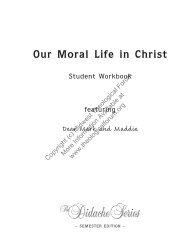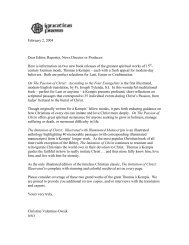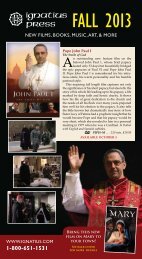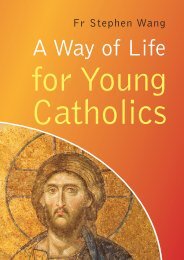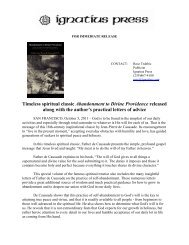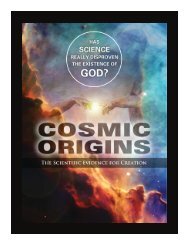Why Brokeback Mountain
Why Brokeback Mountain
Why Brokeback Mountain
Create successful ePaper yourself
Turn your PDF publications into a flip-book with our unique Google optimized e-Paper software.
FILMJake Gyllenhaal andHeath Ledger, thestars of <strong>Brokeback</strong><strong>Mountain</strong>, at theScreen Actors GuildAwards in LosAngeles, on January29, where they weretogether nominatedfor four awards.COURTESY OF UNIVERSAL PICTURESMARIO ANZUONI/REUTERS<strong>Why</strong> <strong>Brokeback</strong> <strong>Mountain</strong>is DifferentThe Academy Award honors for AngLee’s <strong>Brokeback</strong> <strong>Mountain</strong> were theculmination of months of criticaland popular success, including numerousbest-picture and top-ten honorsfrom critics and critics’ associations,weeks of excellent per-screen box officeearnings, and saturation-level pop-culturecelebrity.Late-night monologue references,By StevenGreydanusCriticized as mere homosexual propagandaor hailed as an advancement for homosexualacceptance, <strong>Brokeback</strong> <strong>Mountain</strong> is both moreand less than the sum of those two viewpoints.online poster spoofs, and the ubiquity ofvariations on the catchphrase “I wish Iknew how to quit you” all attest animprobable fact: A “gay cowboymovie”—a film that (much like, say, asubtitled biblical film shot entirely indead languages) might have seemedbefore the fact to be an unlikely hit andquite possibly dead on arrival—has capturedthe national zeitgeist.That it has captured the Hollywoodzeitgeist is much less surprising. Onone level, the fêting of <strong>Brokeback</strong><strong>Mountain</strong> can be seen as merely the latestinstance of Hollywood’s ongoingcelebration of the culture of death in itsmyriad forms. Last year’s awards seasonhad a mini-theme of euthanasia,between Million Dollar Baby and TheSea Inside; this year the theme is genderambiguity, primarily on thestrength of <strong>Brokeback</strong> <strong>Mountain</strong> andTransamerica (Capote also fits thetheme, though it isn’t about the titlecharacter’s sexuality in the sameway). Recent years have also seen laurelsgoing to films honoring abortionists(The Cider House Rules, Vera Drake),deconstructing traditional sexualmorality (Kinsey, American Beauty),and directly assailing religious institutions,especially the Catholic42 THE CATHOLIC WORLD REPORT, March 2006
Church (The Magdalene Sisters, TheCrime of Father Amaro).This year in particular, there is anotherobvious factor: politics. Following onlast year’s honors for Michael Moore’sFahrenheit 9/11, after six years ofPresident George W. Bush and threeyears of war in Iraq, Hollywood has politicson the brain like no time in recentmemory—a preoccupation most obviouslyattested by the overtly politicaldramas Munich, Syriana, Good Night andGood Luck, and The Constant Gardener.It has a profoundlyproblematic point ofview that makes itpotentially farmore insidious thanmere propaganda.Yet unlike these films, <strong>Brokeback</strong><strong>Mountain</strong> is not overtly political. Alongwith March of the Penguins and ThePassion of the Christ, its political significanceis more symbolic than inherent.MAINSTREAMINGHOMOSEXUALITY<strong>Brokeback</strong> <strong>Mountain</strong> does represent anew frontier in the representation ofhomosexuality in mainstream culture.While homosexual characters have beenprominent in pop culture for some time,typically they have been cast in supportingroles (e.g., the best friend), and seldomgiven onscreen partners, therebykeeping actual same-sex relationshipsand activity out of the spotlight.<strong>Brokeback</strong> <strong>Mountain</strong> changes all that.While this makes the film an obviouscultural rallying point for the mainstreamingof homosexuality, <strong>Brokeback</strong> isnot a politicized plea for “gay rights,”nor is it “pro-gay propaganda” of anykind. It is no strident advocacy piece onthe order of, say, The Magdalene Sisters,in which all the characters come neatlylabeled as victim, hypocrite, accomplice,abuser, etc. The Magdalene Sisters is awork of uncomplicated agitprop;<strong>Brokeback</strong> <strong>Mountain</strong> is a work of art,more concerned with telling a storyabout characters than with making surethat the viewer feels a certain way abouta moral issue.That’s not to say that <strong>Brokeback</strong> doesn’thave a point of view. It does have apoint of view—a profoundly problematicone, one that makes it potentially farmore insidious than mere propaganda,which can be more easily dismissed byAng Lee poses with his nominationplaque at the Directors GuildAwards on January 28. Lee wonthe award for best directorfor <strong>Brokeback</strong> <strong>Mountain</strong>.the discerning. All the same, it doesn’tcommit the artistic fraud of shapingevery single element in its story to movethe viewer’s sympathies in one andonly one direction. As a critic, I find thatsort of one-sidedness quickly sabotagesa film’s persuasiveness; nothing else soglaringly announces that the filmmakerhimself hasn’t really put his own pointof view to the test, and doesn’t trust theaudience to see things his way unless hestacks the deck in his own favor.What I often find most compelling isa filmmaker bold enough to stack thedeck against himself—to insist on hearingthe case for the opposite point ofview, on seeing those on the other sideas human beings rather than comfortablestereotypes. Tim Robbins did thisin Dead Man Walking when he allowedthe grieving relatives of Poncelet’s victimsto be sympathetic, suffering soulsrather than vengeful ogres. <strong>Brokeback</strong><strong>Mountain</strong> isn’t as exquisitely even-handedas Dead Man Walking, but it keeps thecards sufficiently mixed to feel far morehonest than The Magdalene Sisters.Ennis Del Mar (Heath Ledger) andJack Twist (Jake Gyllenhall) are a pair ofpoor ranch hands who meet when theyboth get a job watching a flock of sheepon a Wyoming promontory called<strong>Brokeback</strong> <strong>Mountain</strong>. Ennis is taciturnand Jack coltish and awkward, but theyslowly begin to know one another.FRED PROUSER/REUTERS“My mama, she believes in thePentecost,” remarks Jack, by way ofexplanation of a snatch of Gospel musiche’s just facetiously belted out.“What exactly is the Pentecost?” asksEnnis, idly curious. “My folks, they wasMethodist.”Whatever persuasion Jack’s upbringingwas, he’s not entirely sure whatPentecost is either. Actually, he seems tohave the Apocalypse in mind: “I guessit’s when the world ends… and folkslike you ’n’ me march off to hell.”“Speak f’y’self,” returns Ennis. ”Youmay be a sinner… but I haven’t had theopportunity.”That soon changes. Jack and Ennishave months of long, cold mountaindays and nights ahead of them; and, astheir employer for the moment will laterremark, they find a way to pass the time.The terms of their employment call forthem to spend the nights separately, oneat the campsite and one roughing itamong the sheep. This isn’t quite legal,but then Jack and Ennis aren’t particularlyscrupulous—about the law or theiragreement with their employer. Oneparticularly cold night, they wind upsharing the tent—and then, much to theshock of Ennis, Jack unceremoniouslyoffers him the opportunity to sin, and hetakes it.Essentially everystraight male characterin the film is not onlyunsympathetic, butunsympathetic preciselyin his embodimentof masculinity.In one of the film’s postscripts, Ennishappens to meet that mother of Jack’s,as well as his father, who may or maynot believe in Pentecost. Jack’s parentsapparently have some idea of the sort ofrelationship their son had with Ennis,and Mr. Twist seems to take a dim viewof the whole business and of his son ingeneral, from the latter’s many unrealizedplans to his wishes regardingarrangements in the event of his demise.Mrs. Twist, however, seems more sympatheticand understanding, and offersto let Ennis see the room Jack grew upin, which she keeps just as he left it.When Ennis emerges from the roomwith a memento, she puts it in a bag forhim without a word.Does this scene suggest that Mrs.THE CATHOLIC WORLD REPORT, March 2006 43
Twist, as a true Christian, accepted herson without judgment for what he was,and likewise accepts this stranger andhis relationship with her son in the sameway? Does she love the sinner and hatethe sin, or is she not particularly botheredby either? Or could it be that Mrs.Twist isn’t necessarily particularlydevout or well-formed in her faith afterall—since, for example, her own sondidn’t know the end of the world fromthe Church’s birthday? The ambiguityof the scene, and of the characterization,is a mark of the distance between thisfilm and one like The Magdalene Sisters.HEAVY-HANDEDPORTRAYAL OF FAMILY LIFEEnnis and Jack each marry, and theirongoing affair is allowed to be at least asmorally problematic as any other extramaritalaffair. A lesser filmmaker mighthave painted the women as nags orharpies, but Ang allows Ennis’s wifeAlma (Michelle Williams) in particular agreat deal of poignancy, and doesn’tavoid showing the pain that Ennis’sbetrayal causes her as well as the children.Jack’s wife Lureen (AnneHathaway), a rodeo princess and heavyequipmentheiress, is likewise appealingand sympathetic, though less developedas a character, and lacking a satisfyingcharacter arc.The director’s subtletyfalters here as hedepicts parenthood withone opprobrious imageafter another.An early bedroom scene betweenEnnis and Alma suggests some realmutual affection and desire; at the sametime, clearly the two are somewhat atodds sexually. Alma wants to be withEnnis face to face, a position perhapssuggestive of the inherently complementaryand interpersonal nature of the maritalact. Ennis, though, is necessarilyused to doing things in a way that sidestepscomplementarity, and seems toprefer the interlocking of bodies withoutthe face-to-face intimacy his wife desires.They must not get it entirely wrong,for in time there are children. The director’ssubtlety falters here as he depictsparenthood with one opprobriousimage after another: colicky babies crying;repeated shots of a harried Ennisstruggling with a child in each arm;quarrels over who will watch the children;a wincingly embarrassing momentinvolving an accident at a grocery storethat would have been bad enough ifAlma had only been at the store as ashopper rather than as a clerk. By contrast,Ennis and Jack’s “fishing trip“ getawaysare all stunning mountain vistasand relaxed conversations, accompaniedby serene guitar strumming on theGustavo Santaolalla soundtrack.It’s heavy-handed for a while, butAng eventually recovers. Ennis’s marriagegoes south, but his screamingHeath Ledger as “Ennis Del Mar”and Jake Gyllenhaal as“Jake Twist” in a scene from<strong>Brokeback</strong> <strong>Mountain</strong>.COURTESY OF UNIVERSAL PICTURESbabies grow up nicely into girlhood andyoung womanhood, so parenthood isallowed to have some reward.Meanwhile, Jack becomes increasinglyjealous and resentful over the scarcity oftheir time together, and finds outlets forhis restless appetites where he can,cruising for male prostitutes in Juarezand taking up with another marriedman. (Interestingly, he tells Ennis aboutthe affair, but says it’s with the wiferather than the husband—a shrewd lie,apparently, judging from Ennis’sunthreatened amusement. By contrast,Ennis turns cold with fury at hints ofJack’s trips to Mexico.)Of course, all this jealousy and frustrationis ultimately rooted in thefurtive, surreptitious nature of theirrelationship, which in turn is largelygrounded in the social realities of theirplace and time. Jack harbors a secretwish for a different life with the two ofthem together on a ranch somewhere,but Ennis is convinced that two men livingtogether can only end badly. Indeed,he knows of such a case from his childhood,since his father made a point ofshowing him the mutilated bodies oftwo local men killed in a gay-bashingattack. “For all I know, he did the job,“Ennis adds.Toward the end of the film is a similaract of violence, though here Ang’s directorialtouch is at its most delicate, leavingthe suggestion of “homophobia”implicit, even debatable. Where aheavy-handed director trying to drivehome a message would have rubbedour noses in the violence, letting us hearthe hate-filled epithets, the murderoustaunts, Ang is content to suggest. Hedoesn’t even make it absolutely clearthat the fleeting images we see necessarilyrepresent what really happened,rather than another character’s guessesor imaginings. The character in questionisn’t sure what really happened, andneither, perhaps, are we.UNSYMPATHETIC TOWARDHETEROSEXUAL MENAt the opposite end of the spectrum isone relatively minor but crucial respectin which Ang’s subtlety and even-handednesslargely fail him, and it is here thatthe film’s point of view becomes mostglaringly clear. Whenever it considersstraight men, <strong>Brokeback</strong> <strong>Mountain</strong> beginsto verge toward Magdalene Sisters–styleprejudicial stereotyping. The film allowsits sexually omnivorous protagonists tobe morally ambiguous, and its straightwomen can be likable and sympathetic.Yet essentially every straight male characterin the film is not only unsympathetic,but unsympathetic precisely in hisembodiment of masculinity.<strong>Brokeback</strong> <strong>Mountain</strong>is nothing less thanan indictment not justof heterosexism but ofmasculinity itself, andthereby of human natureas male and female.At its most extreme, the film’s briefagainst masculinity takes the form ofdeadly homophobic violence, as in thebrutal episode recounted by Ennis andin the murderous images toward theend of the film. Closely related is thepedagogy of Ennis’s father, with his horrificattempt to instill manly attitudes inhis son by exposing him to the sight ofthe victims.44 THE CATHOLIC WORLD REPORT, March 2006
Not as despicable, but in the samevein, is Jack’s overbearing father-in-law,whose concern for his grandson’s buddingmasculinity causes him to undermineJack’s parental authority by turningon a football game for the lad afterJack had just turned it off. “Want yourboy to grow up to be a man, don’t you,daughter?“ he drawls to Lureen. “Boyshould watch football.“ How little theold man thinks of Jack’s masculinity hasbeen made only too plain—though Jacksurprises them all, sharply reassertinghis authority and putting his father-inlawin his place, to the silent but gratifiedapproval of his wife.Other examples include Jack’s ownvaguely disapproving father; the sheepmagnate of <strong>Brokeback</strong>, whose disdainfor Jack is meant to be partly professionaland partly homophobic; a rodeoclown who contemptuously rebuffs apass from Jack; and even a random pickup-truckdriver whom a volatile Ennisshockingly attacks and beats in responseto the former angrily calling him anobscene name. Though the truck driver’smacho belligerency doesn’tremotely warrant the violence that follows,it does perpetuate the film’s patternof hostile or disapproving machomanstereotypes of masculinity.What prevents all this from turning<strong>Brokeback</strong> <strong>Mountain</strong> into a MagdaleneSisters–style tract is simply that Ang is farless interested in wallowing in the “evilsof heterosexism and homophobia” thanMullan was in wallowing in the evils ofthe Magdalene asylums. None of Ang’smen-behaving-badly becomes a caricaturelike Mullan’s nuns, and the film isn’treally about them anyway.Other than a passing comment fromEnnis about the “fire-and-brimstonecrowd,” religion is almost totally absent.On the one hand, this means that antigayattitudes aren’t particularly attributedto Christian teaching or belief. Onthe other hand, it means that the rangeof moral issues relating to Jack andEnnis’s relationship is rhetorically limitedto conflicting commitments to theirspouses and children—and, of course,the intolerance of society itself.ART OR PROPAGANDA?The meaning of a work of art cannotbe reduced to a thesis or proposition; ifit can, it is not art but propaganda, atract. <strong>Brokeback</strong> <strong>Mountain</strong> is not a tract.Still, there is a perspective at work in itsdepiction of these characters and events.The film does not argue, but assumes,that the pain suffered by men like Ennisand Jack and those around them is theresult of what is and isn’t permitted byentrenched social attitudes of intoleranceand hate, which constrain suchmen from following their bliss, and corralsthem into conventional arrangementsthat are ultimately truly satisfactoryto no one.Thus, while Ennis and Jack aren’tentirely let off the hook for failing to fulfilltheir obligations to their families (oreven to their employer in the first act),the most serious charges are laid at thefeet of the heterosexist society.Compared to this film, the euthanasiaadvocacy of Million Dollar Baby, the anti-Catholicism of The Magdalene Sisters andthe abortion activism of The Cider HouseRules are practically child’s play.In the end, in its easygoing, nonpolemicalway, <strong>Brokeback</strong> <strong>Mountain</strong> isnothing less than an indictment not justof heterosexism but of masculinity itself,and thereby of human nature as maleand female. It’s a jaundiced portrait ofmaleness in crisis—a crisis extendingnot only to the sexual identities of thetwo central characters, but also to thevalidity of manhood as exemplified byevery other male character in the film. Itmay be the most profoundly anti-westernwestern ever made, not only postmodernand post-heroic, but post-Christian and post-human.STEPHEN GREYDANUS frequentlyreviews films for CWR and more of his filmreviews may be found at decentfilms.com.THE CATHOLIC WORLD REPORT, March 2006 45





